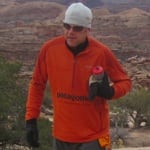Patagonia has always been a big supporter of environmental causes, and as a result they have been subject to intense criticism over the years. In one case, a group was criticizing their support of certain environmental causes with a boycott of their products. Members of the opposing group picketed outside many Patagonia stores in protest of the company’s policies. In response, Patagonia began the “pledge-a-picket” program, whereby they would “reward” every picketer who showed up to their stores with a ten-dollar donation to the organization being picketed against, in their name. The picketing soon stopped and the boycott fell apart.
In 2008, Tim DeChristopher, a student at the University of Utah, attended an auction for the sale of oil and gas leases in Southern Utah. Registering himself in his correct name, he bid on over $1.2 million in leases surrounding the area of Arches and Canyonlands National Parks. When authorities became aware of the fact that DeChristopher did not actually have the money to pay for the leases, the auction was halted. He has since been convicted of two felonies for his actions and is facing a maximum sentence of up to ten years in prison and $750,000 in fines. At the same time, the intense media attention surrounding the event has led to much higher public scrutiny of the leases. The mayor of Moab, Dave Sakrison, submitted a report prior to the auction stating that the drilling of oil and gas in Spanish Valley south of Moab could negatively affect the town’s water quality. Furthermore, Secretary of the Interior Ken Salazar has since pulled many of the leases on which DeChristopher bid from the market. These actions, however, will not affect DeChristopher’s sentence, which he faces openly and in full acceptance of his actions.
Getting into the Hardrock 100 is really hard to do lately, with nearly 600 people applying for 140 spots for the 2011 race. The lottery system has been scrutinized heavily, but a consensus is yet to be reached on how best to accommodate runners. Part of the lottery rules state that runners who have finished five or more Hardrocks gain automatic entry to the race indefinitely. Given the difficulty of getting in otherwise, many five-time finishers now enter the race just because they can, regardless of whether they’ve been training or actually have a legitimate chance of finishing. But Roch Horton is different. Despite being an accomplished ultrarunner who continues to train and race competitively, Roch has opted out of his guaranteed entry at Hardrock this year. For the past ten years, Roch has run the race. He has finished every single time and says Hardrock is one of his favorite races in the world. But after a decade of running through the San Juans every summer, Roch has decided not to run the race any longer and instead “give someone else a chance.” He says he has had some of the best times of his life at Hardrock and is ready to step back to allow someone new to have a shot.
What do these stories have in common? They are all instances of individuals taking personal action to effect the change they believe in. Instead of complaining or, worse, resorting to violence, these people came up with creative ways to make their beliefs reality. Patagonia found a way to reduce the power of their detractors while simultaneously supporting the causes they’d backed all along. Tim DeChristopher saw what he termed, “ an injustice being committed, and I thought it was a greater injustice than anything I could do to try to stop it.” So he disrupted the process in such a way that personally harmed none while drawing massive public attention to his cause. Roch Horton recognized that sweeping change to the Hardrock lottery is unlikely in the near future and may even be unnecessary, so he utilized the only power he had and sacrificed his own entry in favor of someone who has never had the opportunity to experience the race.
Grassroots actions such as these showcase the unexpected power individuals wield over large forces. Ranging from personal abdication of guaranteed rights to creative retaliation and even nonviolent civil disobedience, each of these actions created not only the intended change, but also a precedent for others to follow. Although the larger processes governing the actions being fought have not changed, the individual cases have. If people continue to enact change on this level, the actions have the potential to add up to such a number that large-scale change is inevitable. The power of individuals is a potent force indeed.
Call for Comments
Please share your stories of standing up for your beliefs, whether they’re autobiographical or of someone who’s inspired you.

